Editorial. Рубрика в журнале - Economic and Social Changes: Facts, Trends, Forecast
A difficult road after the Rubicon
Статья научная
February 24, 2022, the RF President announced the beginning of a special military operation on the territory of Ukraine, which entailed large-scale geopolitical changes and, among other things, became a Rubicon for the internal development of the Russian Federation. The article analyzes a number of complex implications that resulted from the events occurring after February 24, 2022, and which had a significant impact on the state of Russian society. We consider in detail the dynamics of the moral state of Russian society for the period from 1996 to 2020, which (as shown by the results of the conducted research) over the past almost 25 years were negative and were developing within the framework of the existing liberal model. Analyzing the data of official statistics and sociological surveys, we rely on the assessments of experts, who, in many respects, agree that after February 2022, a new, albeit difficult, road opens up before Russia; the country has to travel this path one way or another, in order to achieve full (internal and external) national sovereignty in the contours and rules of the new geopolitical reality that are forming before our eyes.
Бесплатно
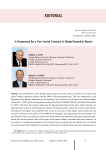
A framework for a new social contract is being formed in Russia
Статья научная
The development of the foreign policy situation and the course of actions in the area of the special military operation indicate that the SMO is becoming protracted. This was emphasized by the President of the Russian Federation at the meeting of the Council for Civil Society and Human Rights (December 7, 2022) and at the expanded meeting of the Board of the RF Ministry of Defense (December 21, 2022). Therefore, the situation itself urges the Russian leadership and the entire ruling vertical to set goals and tasks aimed to comprehensively change the Russian society so that the country could achieve full national sovereignty and competitiveness in the 21st century. In this regard, many experts say that currently in Russia in the context of the SMO the prerequisites are being created for the formation of a new Social Contract, as well as new criteria for the coexistence and interaction of society and government, which will become relevant after all the goals of the special military operation have been achieved. In the article, we consider new features of civil society that are evolving into the outlines of a new Social Contract; factors that contribute to and hinder this process; conditions that need to be implemented in order for these still disparate contours to develop into concrete, real-life points of the Social Contract, supported by the majority of the population and determining the legitimacy of power at the new historical stage of Russia’s development.
Бесплатно
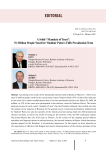
A solid “mandate of trust”: 76 million people voted for Vladimir Putin’s fifth presidential term
Статья научная
According to the results of the presidential election held in Russia on March 17, 2024, more than 76 million people voted for the current head of state Vladimir Putin (87% of those who took part in the vote); this is almost twofold greater than in his first presidential election (on March 26, 2000, 40 million, or 53% of the voters who participated in the election, voted for Vladimir Putin). The article analyzes reasons for such a solid “mandate of trust” that the President obtained; they include not only the support of the majority of Russians for the general course of national development implemented by Vladimir Putin, but also the specifics of the historical period during which the 2024 presidential election was held, as well as the results of voting on the territory of the new RF constituent entities that joined Russia after the 2014 coup in Ukraine. In the context of the ongoing special military operation and lingering threats to national security, the internal situation in Russia, which determines popular support for the President, is of particular importance. In this regard, we draw attention to the importance of effective (full-fledged and timely) implementation of the election promises of the head of state, which Vladimir Putin announced in his Address to the Federal Assembly of the Russian Federation on February 29, 2024. The fulfiilment of the tasks set by the President for the period up to 2030 largely depends on the elites in the system of public administration; therefore, at the beginning of a new political cycle and Vladimir Putin’s fifth presidential term (2024-2030) a lot will depend on the new Government of the Russian Federation, whose composition will be announced in May 2024, after the presidential inauguration. With the help of expert assessments, statistical data and the results of sociological surveys we analyze reasons for the incomplete fulfillment of instructions and tasks that Vladimir Putin outlined in his previous election speeches, and in relation to the current situation we conclude that the key conditions for further implementation of the national development course are the achievement of all the goals of the special military operation and the continuation of the process of nationalization of the elites. The article presents calculations based on official data of the Central Election Commission of the Russian Federation on the results of the presidential elections of 2024 and 2018 in all constituent entities and federal districts of the Russian Federation. We analyze the allRussian dynamics of turnout and voting results in ah presidential elections in Russia for the period from 2000 to 2024. We make an overview of expert assessments regarding the work of the RF Government headed by M.V. Mishustin. The facts showing the presence of acute unresolved problems in the system of public administration are collected and systematized in key areas of national development.
Бесплатно
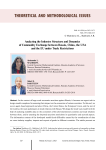
Статья научная
In the context of large-scale economic sanctions against Russia, it becomes an urgent task to design model complexes for assessing their impact on the economies of various countries. To this end, we use an agent-based approach and select China, the United States, the European Union, and the rest of the world as the main participants in trade relations with Russia. We design the trade wars model with the help of analyzing available data on the economies of the abovementioned countries and trade relations between them, and by assessing the imposed sanctions restrictions in quantitative and sectoral aspects. The information content of the developed model faced difficulties caused by the coordination of data on cross-industry supplies, imports and exports of goods in different countries. The article presents an algorithm that determines the sequence of processing the initial statistical data and bringing them to a unified form with detailed elaboration necessary for the model. The formation of arrays of initial data is carried out on the basis of the Federal State Statistics Service of Russia, Federal Customs Service, Eurostat, U.S. Bureau of Economic Analysis, National Bureau of Statistics of the People's Republic of China and the World Bank. To unify the information of these agencies, eleven enlarged industries are created in the model; each of the industries corresponds to one or more industries or commodity groups. The target result of applying the algorithm is construction of cross-country tables of industry supplies of intermediate and investment goods, containing data on trade in Russia, the USA, the EU, China and the rest of the world. In the course of data processing, we also analyzed the sectoral structure of international commodity exchange in 2021, which indicates a close relationship between the economies of the European Union and Russia before the introduction of large-scale sanctions, and relatively low indicators of commodity exchange between Russia and the United States. An analysis of the dynamics of trade exchange between Russia and the countries that imposed sanctions restrictions in 2022 showed that Russia's imports from the EU countries fell by 38%, and exports in value terms increased by 24%, which is primarily due to a sharp increase in energy prices. For the United States, the drop in exports and imports with Russia was 70% and 50%, respectively.
Бесплатно
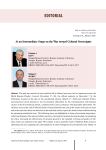
At an intermediate stage on the way toward cultural sovereignty
Статья научная
The past two months of socio-political life in Russia have been rich in important events: the World Russian People’s Council (November 27-28), the official approval on December 7 by the Federation Council of the date of the presidential election (March 17, 2024) and Vladimir Putin’s announcement of his decision to run for president (December 8), his communication with Russian citizens in the live broadcast format, combined with a press conference with journalists (December 14). All these events at the end of Vladimir Putin’s 4th presidential term sum up the events of the past six years and at the same time focus our attention on the tasks that society expects the head of state to address during his upcoming presidential term. The following issues are highlighted as being of increasing importance: achieving the goals of the special military operation, forming the national idea and ideology, nationalizing the elites, increasing the effectiveness of dynamic growth in the standard of living and quality of life; these events are analyzed in the paper. We consider in more detail the work of Vladimir Putin aimed at addressing the issue regarding the nationalization of elites throughout his presidential terms. Based on expert assessments, we analyze the factors that prevent the President from solving this problem promptly; most likely, the solution of the problem of nationalization of elites will be postponed for 2030-2036, that is, for the possible (according to the current Constitution of the Russian Federation) sixth presidential term of Vladimir Putin. Nevertheless, according to many experts, without qualitative ideological changes within the elites (primarily in the system of public administration, culture, education), as well as without achieving the goals of the special military operation, it is impossible to make significant progress in shaping the image of the country’s future, achieving the consent of the majority of the population on the essence of a new Social Contract, which is based on the image of a just social state with equal opportunities for the main segments of the population on the territory of Russia. The article provides a comparative analysis of the most significant public statements that Vladimir Putin made throughout his presidential terms: his first program article “Russia at the turn of the Millennium” (1999), the RF President’s speech at the conference on international security policy (“Munich speech” on February 10, 2007), all the speeches of the head of state at the World Russian People’s Council (December 13, 2001, November 1, 2018 and November 28, 2023). The conclusion is made about Vladimir Putin’s key personal qualities (perseverance, strategic foresight, courage in setting ambitious goals, systems approach to their implementation) necessary for a national leader to continue the development of Russia along the path of strengthening cultural and, in general, national sovereignty.
Бесплатно
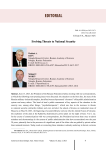
Evolving threats to national security
Статья научная
June 13, 2023, the President of the Russian Federation held a meeting with war correspondents, at which the following most pressing issues were discussed: the situation on the front line, the state of the Russian military-industrial complex, the effectiveness of personnel “elevators” of the public administration system and many others. The head of state’s public assessment of key aspects of the situation in the country was, among other things, “psychotherapeutic”, which was due to the increase in threats to national security, primarily military and even terrorist: the attack of drones on residential areas of Moscow on May 30, 2023, the beginning of counteroffensive on June 4 by the Armed Forces of Ukraine, the explosion of the dam at the Kakhovka hydroelectric power plant on the night of June 5 to 6, etc. In the course of communication with war correspondents, the President had more than once to admit mistakes and shortcomings in the system of public administration that have accumulated over the past 30 years, primarily due to the presence of a significant part of the elites who are guided by private rather than national interests. Today, work on correcting these mistakes is already underway in forced, extreme
Бесплатно
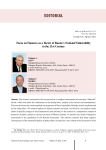
Focus on finances as a factor of Russia's national vulnerability in the 21st century
Статья научная
The research, presented in the current article, is a logical continuation of a previous “Editorial” article, which was about the soullessness of the ruling elites, analysis of its reasons and consequences. This article focuses on common global consequences of liberal capitalistic ideology actively implemented by the ruling elites. The authors explore its historic purpose and tools, use the facts, and analyze results shown in specific changes of social assessments and attitudes. In the context of a comparative analysis of dynamics of public opinion in the key countries of Western Europe, we describe the trends of subjective assessments of the population in the Russian Federation. The authors conclude that many negative consequences of the purposeful policy of global elites (in particular, ones related to the destruction of the system of traditional values and norms) exist in Russia, which requires increased attention and active state policy in matters related to the development of ideology and overcoming the soullessness of the ruling elites as a natural attribute of the historical period of postmodernity. The study is based on respected international sources of official statistical information (World Bank) and sociological measurements (European Social Survey, Edeleman Trust Barometer), as well as on the results of Russian and regional public opinion polls.
Бесплатно
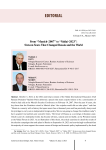
From “Munich-2007” to “Valdai-2023”: sixteen years that changed Russia and the world
Статья научная
October 5, 2023, at the 20th anniversary session of the Valdai International Discussion Club Russian President Vladimir Putin delivered a speech that many experts believe to be a continuation of what he had said at the Munich Security Conference on February 10, 2007. Over the past 16 years, the key theses that the President voiced in Munich (that “the unipolar world did not take place” and that “Russia is a country with a history that spans more than a thousand years and has practically always used the privilege to carry out an independent foreign policy. We are not going to change this tradition today”) have acquired real outlines and concrete forms. The future of Russia as a sovereign civilization-state, which is part of a multipolar world, has become obvious, natural and inevitable, as the President stated at the Valdai Forum in 2023. As an illustration of this thesis, the article examines in detail the results of the election campaigns that took place in Russia on September 10, 2023 and convincingly confirmed that the majority of voters support the current course of foreign and domestic policy implemented by the head For citation: Ilyin V.A., Morev M.V. (2023). From “Munich 2007” to “Valdai 2023”: Sixteen years that changed Russia and the world. Economic and Social Changes: Facts, Trends, Forecast, 16(5), 9-31. DOI: 10.15838/esc.2023.5.89.1 of state. The article presents our calculations based on official data of the Central Election Commission of the Russian Federation; we carry out an in-depth comparative analysis of the results of the regional elections of 2018 and 2022, and analyze voting results in the context of regional centers; we also consider factors that influenced voter turnout. This makes it possible to identify new and more in-depth features of public sentiment, according to which a significant part of voters demands that the current elites (political, economic, cultural) be brought in line with the national socio-political agenda related to the goals of the special military operation and the positioning of Russia as a civilization-state. In general, the analysis has shown that both inside Russia and in the international political arena, there are still a lot of forces desperately clinging to the “old” world order and hindering the natural course of the changes taking place. This suggests that the process of transformation of Russia and the whole world, which in fact began 16 years ago, has not yet been completed and, apparently, this task is postponed for 2024-2032 - the period that may become the next presidential term for Vladimir Putin. At the same time, the successful achievement of all the goals of the special military operation was and remains the main prerequisite for the implementation of Russia’s transformation.
Бесплатно
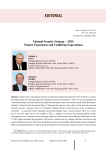
National security strategy - 2021: positive experiences and conflicting expectations
Статья научная
In May 2016, analyzing the interim results of the third presidential term of V.V. Putin, as well as the National Security Strategy, signed by the head of state on December 31, 2015, we have concluded that “the contradictions existing today in the public administration system are a natural result of the President's activities” related to the unresolved task of “bringing the interests of the elites in line with the national security interests” (Source: Ilyin V.A. President Vladimir Putin's third four-year term: contradictory outcomes - an expected result. Economic and social changes: facts, trends, forecast, 2016, no. 2 (44). pp. 9-21). Five years later, in the middle of 2021, a number of internal and external political events (including the new National Security Strategy signed by the President of the Russian Federation on July 2, 2021) again actualizes the question of the need to analyze the key changes that have occurred in the country during this period. How have the Russian society and the public administration system changed? What conceptual problems are still unresolved? And the most important: what role can the current trends in the development of the state and society play in the context of ensuring Russia's national security, taking into account the current situation in the domestic and foreign political arena by the middle of 2021? The following material reflects the authors' point of view on these issues. Based on expert assessments, data of official statistics, and Russian and regional sociological studies, the article analyzes the essence and prospects for the implementation of specific provisions of the National Security Strategy 2021. The authors come to the conclusion that the Strategy objectively reflects the current position of Russia in the domestic and foreign political arena by the middle of 2021, while its key points are aimed at a longterm perspective and are focused primarily on strengthening moral component of the Russian elites and Russian society. This causes positive feelings, but at the same time, based on the analysis of the previous experience in achieving strategic goals and objectives set out in the “May decrees” and national projects, it leaves conflicting expectations about the realism of their practical implementation.
Бесплатно
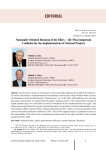
Статья научная
In the previous issues of our journal12 we have repeatedly addressed the problem of ineffectiveness of the Government’s implementation of the President’s instructions, which Vladimir Putin voiced in his Addresses to the Federal Assembly, in “May Decrees”, etc. In the 2018-2024 political cycle, the main directions of state policy are implemented through 12 national projects. The comprehensive analysis of expert opinions urges us to talk about the threat of disruption of their implementation once again. The following materials analyze the essence of national projects, the dynamics of their implementation, since their adoption (2005), during V. Putin’s third presidential term (2012-2018), as well as the specifics of the current socio-political situation in Russia in 2018-2019, which urgently requires a qualitative increase in the responsibility of the elites for the comprehensive achievement of the targets specified in the national projects for 2018-2024. 1 See, for example, editorials in the following issues of Economic and Social Changes: Facts, Trends, Forecast: vol. 11, no. 2 (2018); vol. 10, no. 3 (2017); no. 2 (26) (2013); no. 6 (30) (2013); no. 3(21) (2012).
Бесплатно
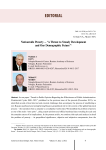
Nationwide poverty - “a threat to steady development and our demographic future”
Статья научная
In our paper “Trends in Public Opinion Regarding the Effectiveness of Public Administration. Presidential Cycles 2000-2021” published in the previous issue of the journal (December 2021), we identified several critical internal and external challenges that accompany the process of establishing a new Russian statehood and strengthening Russia’s geopolitical role in the context of the global historical process - the transition from a unipolar to a multipolar world order. We identified the problem of poverty as one of the main “sore spots”, citing expert opinions and official statistical data revealing its scale and the complex nature of its implications. In the present article, we continue this topic and analyze in detail the problem of poverty - its geopolitical significance, objective and subjective components, how the 1 dynamics of the standard of living and quality of life are perceived in various socio-demographic groups, as well as the key reasons that, in our opinion, explain why poverty has been an acute problem for Russia for more than a decade.
Бесплатно
On the way toward crossing the inner Rubicon
Статья научная
February 24, 2022, the President of the Russian Federation announced the beginning of a special military operation on the territory of Ukraine; this, in fact, became a Rubicon in the 30-year history of Russia’s existence within the framework of the liberal-democratic development paradigm imposed by the Collective West. Six months have passed since the launch of the operation. During this period, Russian society has faced unprecedented sanctions pressure from the United States and NATO and the withdrawal of a significant number of large foreign companies from the Russian market; the situation in Ukraine continues to arouse significant concerns. Sociological surveys indicate that the majority of Russian citizens support the President and the goals of the special operation. However, representatives of different social strata react differently to the events taking place in internal and external political and economic life. The article analyzes trends in social sentiment and the level of approval of the President’s work on the basis of long-term monitoring of public opinion conducted by VolRC RAS in the territory of the Vologda Oblast. We conclude that the broad strata of Russian society feel the effect of the measures taken by the RF President and the RF Government to mitigate the effects of sanctions pressure on the economy and the quality of life and improve the spiritual, moral and cultural atmosphere that corresponds to the goals of national development in the current geopolitical situation; the attitude toward the measures is reflected in the assessments of public opinion. Besides, relying on expert assessments and statistical data, we dwell upon the problem of whether the views of individual representatives of Russia’s ruling circles and financial and cultural elites correspond to the RF President’s goals to “build and strengthen Russia as a strong sovereign power”, whose sovereignty “cannot be segmented or fragmented in the 21st century” as Vladimir Putin noted at the Saint Petersburg International Economic Forum on June 17, 2022. That is, sovereignty must be complete, not only political, economic or military, but, first of all, spiritual, cultural and moral. To achieve the set goals of national development, it is necessary to change the elites in the system of public administration, economy and culture. It is necessary to move from the elite, which was formed during the period of the country’s life in the framework of the liberalcapitalist paradigm before the special operation, to the elites that ensure the sovereign development of Russia based on traditional spiritual and moral values and social justice.
Бесплатно
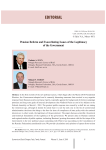
Pension reform and exacerbating issues of the legitimacy of the government
Статья научная
In the first months of the new political season, which began after the March 2018 Presidential Election, the Government adopted and is currently discussing measures that received a very negative response from Russian society and many experts, especially against the background of election campaign promises and long-term goals of internal development that Vladimir Putin set out in his Address to the Federal Assembly on March 1, 2018. The greatest public response was caused by a draft law on raising the retirement age, although it should be noted that it is not the only one in the list of controversial administration decisions that bring to the fore the issue of compliance of state policy with the national interests or, in other words, the legitimacy of the government. The paper discusses scientific, theoretical and historical foundations of the legitimacy of the government. We present data on Russian national and regional studies of public opinion, indicating Russians’ growing discontent with the first steps of the Government in the new political season coinciding with Putin’s last (according to the Constitution of the Russian Federation) presidential term...
Бесплатно
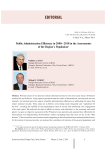
Public administration efficiency in 2000-2018 in the assessments of the region's population
Статья научная
Previous issues of our journal contain editorials devoted to the most acute issues of Russia's modern life and its future. Using expert assessments and the results of international, national and our own research, we touched upon key aspects of public administration efficiency in addressing the issues that ensure national security. These tasks are as follows: overcoming social inequality and “capitalism for the few”, ensuring the stability of the psychological state of society and promoting civic engagement of its main strata. We analyzed the state of affairs in science and education, in the economy and social sphere; we gave an objective assessment of the President's key speeches and analyzed how effectively the Government was implementing the President's orders (including those that were set out in the “May decrees”). We covered the most resonant events happening in the internal and international political arena. In the context of national security, we analyzed the correlation of interests of the general population and the elite...
Бесплатно
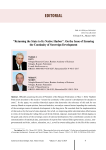
Статья научная
Officially assuming the post of President of the Russian Federation on May 7, 2024, Vladimir Putin drew attention to the need to “ensure the continuity of the country’s development for decades to come”. In the paper, we consider historical aspects that determine the relevance of this task for our country. Based on expert opinion, facts and statistics, we analyze current factors impeding the continuity of the sovereign course of national development in the long term. We conclude that the implementation of this task set by the head of state depends, first of all, on improving public administration effectiveness in terms of reorienting the ruling elites at all levels (federal, regional, municipal) from liberal dogmas to the goals and criteria of the sovereign course of national development. Our contribution consists in the systematization of statistical data, assessments of experts from various fields (government, science, non- governmental activities, culture, education, etc.), as well as events taking place in the life of the country and beyond, which allows us to draw a scientifically substantiated conclusion about the importance of ensuring the continuity of the course of national development implemented by the RF President as a strategic goal intended for the long term after the completion of the next historical round of the civilizational conflict with the Collective West on the terms guaranteeing Russia the possibility of safe and sovereign development in the 21st century.
Бесплатно
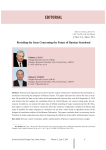
Revisiting the issue concerning the future of Russian statehood
Статья научная
National and regional surveys show that the expert community is dominated by pessimistic assessments concerning the prospects of Russia’s future. The paper discusses the reasons for such a situation. We provide the data on the results of the gubernatorial elections that were held September 9, 2018 and showed that the support for candidates from the United Russia, the current ruling party, has decreased. In addition, we analyze the open data of official reporting of major corporations from five Russian regions; it allows us to draw a conclusion about the existence of legislative conditions in Russia that make it possible for major taxpayers to minimize the tax base, which leads to significant losses of the budgets of constituent entities of the Russian Federation. The paper concludes that it is necessary for the President to make tough decisions aimed at improving the efficiency of the public administration system.
Бесплатно
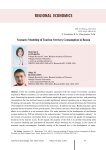
Scenario modeling of tourism services consumption in Russia
Статья научная
Given the unstable geopolitical situation associated with the impact of economic sanctions imposed by Western countries, it is extremely important for Russia to ensure its own steady development pace. Saturating the domestic market with Russian-made high-quality goods and services, and promoting consumption that has declined because people significantly reduced spending due to rising prices, are becoming relevant goals. The task of stimulating domestic consumer demand determines the framework of development of the Russian economy in the near future. To address the issue, Russia possesses a great potential for the formation of new growth points. One of them is tourism, whose high multiplicative effect allows us to consider it as an economic driver. The main priorities for the development of the Russian tourism industry by 2030 are reflected in the national project “Tourism and the hospitality industry”. In the context of economic uncertainty, there is an increasing need to improve the quality of management decisions in the tourism sector. In this regard, the purpose of the work is to develop forecasting tools for scenario modeling and assessment of economic effects obtained due to changes in the volume of domestic tourist consumption. Scientific novelty of the research lies in the development of input-output modeling methodology to determine the economic effects provided by the growth of demand for domestic tourism services. The results of the study have shown that active development of tourism under the optimistic scenario will provide an almost twofold increase in the volume of gross output annually in comparison with the existing rates of tourist services consumption. We use general scientific methods of analysis, synthesis, comparison, generalization, and tools based on input-output methodology. The information base includes the works of domestic and foreign scientists involved in stimulating domestic tourist consumption, scenario modeling and forecasting of the economy, as well as information from state statistics bodies and World Bank data.
Бесплатно
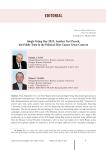
Статья научная
From September 12 to 14, 2025, Russia held its annual Single Voting Day, featuring elections at regional and municipal levels. This electoral campaign was widely seen as a “dress rehearsal” for the 2026 State Duma elections, and many experts concluded that this “test was passed successfully”. However, for several years now, some analysts have pointed out that local elections are increasingly becoming a formality, losing their potential as a tool for diagnosing the relationship between society and the authorities. This article presents the key findings of a long-term monitoring project of regional election campaigns, conducted since 2018 as part of the Editorial column, which includes a comparative analysis of sociological data on public attitudes towards the country's main political parties. As a stage in this monitoring, an in-depth analysis of the 2025 Single Voting Day results is provided: using official data from the Russian Central Election Commission, voter turnout and support for United Russia across regions and regional capitals are analyzed; a review of expert opinions on the concluded campaign is presented; and its specific features in 2025 are examined, including in the context of the geopolitical and civilizational challenges Russia has faced throughout the 21st century and especially since the start of the special military operation. Furthermore, the article continues its monitoring of key managerial decisions made by the President, the State Duma, and the Government. Particular attention is paid to analyzing expert opinions, criminal statistics, and actual instances of detentions of representatives of the ruling “elites”, which indicates a persistent and growing problem of their disconnect from the publicly declared, nationally-oriented development agenda of the Russian Federation, as articulated by the head of state. The authors highlight expert views that public trust in the political elite continues to raise significant and substantial questions. Despite the importance of internal political stability amid a tense international situation and ongoing hostilities within the framework of the SMO, the political system is not yet effective enough in fulfilling its role to meet the public demand for forming a Vision of Russia's Future and a new Social Contract that aligns with the President's stated goals of strengthening traditional values and the core principles of a genuine social state.
Бесплатно
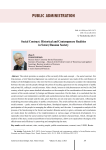
Social contract: historical and contemporary realities in Soviet/Russian society
Статья научная
The article provides an analysis of the currently little used concept - the social contract. For this purpose, a brief historical digression was carried out: an assessment was made of the contribution of thinkers of the Enlightenment, who were the first to substantiate the proposal to consider the relationship between the state and the people through the prism of reaching agreement on the arrangement of public and private life, calling it a social contract. After a break, interest in this phenomenon revived in the 20th century, which is given more detailed information on the example of the consideration of the essence and content of the social contract by foreign and Russian researchers. On this basis, it is concluded that the social contract is an independent scientific and social phenomenon that embodies various forms of social consent between the people and the state, given that they are not only open, but also latent, reflecting the underlying processes taking place in public consciousness. The article defines the criteria inherent in the social contract - goals, means of achieving them, ideological support, the effectiveness of feedback and participation of the people in managing the affairs of society and the state. A comparative analysis of the process of its functioning in the Soviet and modern Russian society is given, estimates and conclusions are made about the problems of its implementation at various stages of historical development. It is especially noted that the social contract has both explicit and latent characteristics, which, through the analysis of the state, trends and problems of social development, allows us to speak about the degree of its effectiveness and efficiency in preserving and strengthening the state.
Бесплатно
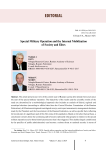
Special military operation and the internal mobilization of society and elites
Статья научная
The article presents our view of the current state of Russian society after almost three years since the start of the special military operation. The objectivity of the results and the scientific novelty of the study are determined by a methodological approach that includes an analysis of federal, regional and municipal elections (according to official data from the Central Election Commission of the Russian Federation), all-Russian and regional sociological surveys, and expert assessments; management decisions made by the President and the Government of the Russian Federation, as well as specific facts reflecting the moral state of a significant part of the elite strata of the population. Based on the above factual basis, a conclusion is drawn about the continuing split of society (primarily elite groups) in relation to the special military operation and to those historical processes that it has triggered. This duality (largely conditioned by the specifics of public administration) can become a serious threat to national security in terms of implementing Russia’s strategic goals in a civilizational conflict with NATO. We conclude that there is a need for internal mobilization of elites in order to bring the system of public administration and key areas of the country’s life in line with the high level of threats to national security and the nature of the historical period of time in which the future of Russia is determined.
Бесплатно

